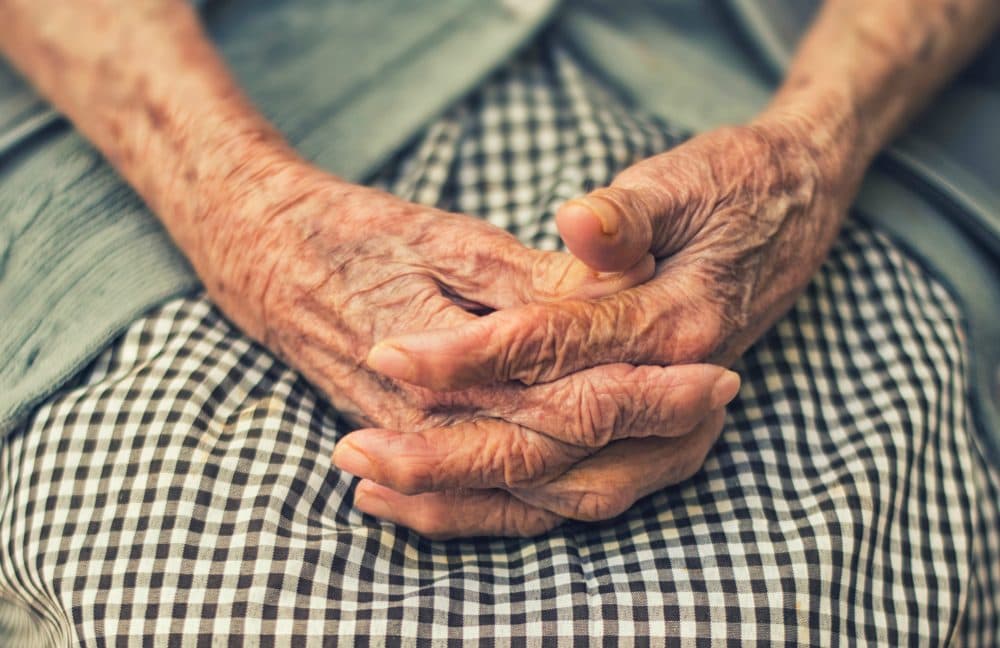Advertisement
Commentary
What Is A Dignified Death? As Her Mother Slips Away, A Daughter Wonders

Late in life, my mother advocated (unsuccessfully) for the passage of a Death with Dignity bill. She’d witnessed enough deaths (and knew she was close enough to her own) to believe that a medically assisted end-of-life could not only reduce suffering, but help a loved one’s survivors. She wanted a death in which she’d have time to express her love and say goodbye to every beloved friend and family member, then drift peacefully off, just like in the movies.
Her ambition was partially realized. She spent the last week of her life in hospice care, surrounded by family, in the chronic care hospital she’d just transitioned to.
Over the course of those seven days, someone was always at her bedside — not just my brother or me, but our children, spouses, our cousins, our cousins’ children and even their kids. The vibe inside her room was often lively, with a lot of laughter and a lot of weeping. We drank coffee, dipped into her giant bag of Sour Patch Kids, talked about politics and the media, about the Winter Olympics and who was crazier, Trump or Kim Jung Un. We reminisced a little, but as befit my mother’s zeal for living in the moment, more often talked about the present and future lives of the young people in the room, my daughter and nieces and nephews in their late 20s and early 30s who’d had the kindness and courage not just to show up at a funeral, but to actively minister to the dying.
... when it’s clear that a person has passed the point of no return, there is little nobility in allowing a fruitless struggle to continue.
We said a prayer with the rabbi, sang "Hallelujah" with the chaplain, and "Peace Like a River" and "Blackbird" with the young music therapist who sat on the floor and strummed in rhythm to my mother’s still peaceful breathing. The song offered a quiet release, reassuring my mother that it was okay to leave us.
All your life, you were only waiting for this moment to arrive.
But did she hear us? Did she know we were there? Was her last moment of consciousness the sound of our laughter, our tears, or the nurse and nurse’s aide quickly, gravely, changing her diaper and rubbing moisturizer into her heels? Was it the speeches from the kids she would have cheered at the March for our Lives demonstrations on television or a commercial for a law firm specializing in winning damages for mesothelioma patients? The tender goodbyes that a procession of family members whispered into her ear, their damp faces buried in her hair. Or, God forbid, the deep and awful gurgle as her body struggled to breathe, to live, though her mind and soul had already said “enough”?
I can’t know if my mother had the death she’d wanted. But I do know that it was needlessly prolonged due to our state’s prohibition against assisted dying.
I recognize that it’s naïve at best, privileged at worst, to think that something as fundamental as dying can or should be orchestrated. Life is irregular and unpredictable, and the better we understand that, the more fully we are able to live. But when it’s clear that a person has passed the point of no return, there is little nobility in allowing a fruitless struggle to continue.
This is not a complaint against the doctors and nurses who treated my mother. On the contrary, they offered competent, compassionate care within the limits of the law. With morphine, Ativan, and gentle hands, they kept her clean and free of pain. And they were as kind to us as they were to her, providing us with a cot to sleep on in her room, a cart with beverages and snacks to sustain those of us keeping a vigil for the last week, and quiet, calm consultations about what was happening and what to expect as her body shut down.
But by the time she stopped breathing, I felt quite certain that her soul had long since departed.
But by the time she stopped breathing, I felt quite certain that her soul had long since departed. Essence and flesh had already cleaved, possibly days before her body enacted that final, ghastly combat between its demand to breathe and its readiness to stop.
“Dying is like being born,” a rabbi told my friend at the end of her father’s life. “The transition in either direction can be a struggle, but it ends in light.”
A Death with Dignity bill is once again under consideration in the state legislature. Its passage would enable a patient like my mother to not only state what medical measures she wanted to be withheld so as not to prolong her life, but the point at which she’d want a medical professional to end it. It would enable health care professionals to not just to ease the struggle, but to mindfully, compassionately end it; to hasten the welcoming glow of the light that I fervently hope greeted my mother, who had been so radiant in life.
